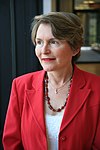South African general election, 2014
|
|
|||||||||||||||||||||||||||||||||||||||||||||||||||||||
|
|||||||||||||||||||||||||||||||||||||||||||||||||||||||
|
|||||||||||||||||||||||||||||||||||||||||||||||||||||||
|
|
|||||||||||||||||||||||||||||||||||||||||||||||||||||||
| Winner by ward of the National Assembly election; a lighter shade indicates a plurality win without a majority. African National Congress indicated by green, Democratic Alliance by blue, Inkatha Freedom Party by red, National Freedom Party by orange and other parties by grey. | |||||||||||||||||||||||||||||||||||||||||||||||||||||||
|
|||||||||||||||||||||||||||||||||||||||||||||||||||||||
Jacob Zuma
African National Congress
Jacob Zuma
African National Congress
The 2014 South African general election was held on 7 May 2014, to elect a new National Assembly and new provincial legislatures in each province. It was the fifth election held in South Africa under conditions of universal adult suffrage since the end of the apartheid era in 1994, and also the first held since the death of Nelson Mandela. It was also the first time that South African expatriates were allowed to vote in a South African national election.
The National Assembly election was won by the African National Congress (ANC), but with a reduced majority of 62.1%, down from 65.9% in the 2009 election. The official opposition Democratic Alliance (DA) increased its share of the vote from 16.7% to 22.2%, while the newly formed Economic Freedom Fighters (EFF) obtained 6.4% of the vote.
...
Wikipedia




